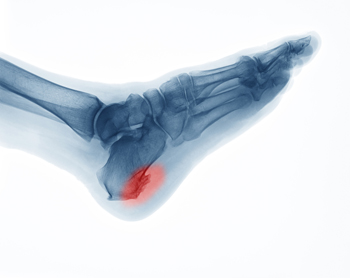Wearing Orthotics May Help Heel Spurs
Tuesday, 14 June 2022 00:00
A bony growth that forms on the back of the heel bone is known as a heel spur. It can gradually produce severe pain and discomfort, and it may become difficult to walk. A heel spur can develop for several reasons, including wearing shoes that do not fit correctly, exercising on hard surfaces, or standing for long periods. A common symptom that many people experience is a sharp pain in the bottom of the heel, and this may diminish while walking. After a proper diagnosis is performed, correct treatment can begin. It may be beneficial to practice specific stretches that can help to ease the pain of a heel spur. An effective stretch consists of standing on a step and lowering the heel until a gentle pull is felt. Some patients find it can help to wear custom-made orthotics that can control the excess motion that affects the bottom of the foot. Additionally, orthotics can help take the pressure off of a heel spur. If you are affected by this painful foot condition, please consult with a podiatrist who can determine what the best form of treatment is for you.
Heel spurs can be incredibly painful and sometimes may make you unable to participate in physical activities. To get medical care for your heel spurs, contact the podiatrists from New England Family Foot Care. Our doctors will do everything possible to treat your condition.
Heels Spurs
Heel spurs are formed by calcium deposits on the back of the foot where the heel is. This can also be caused by small fragments of bone breaking off one section of the foot, attaching onto the back of the foot. Heel spurs can also be bone growth on the back of the foot and may grow in the direction of the arch of the foot.
Older individuals usually suffer from heel spurs and pain sometimes intensifies with age. One of the main condition's spurs are related to is plantar fasciitis.
Pain
The pain associated with spurs is often because of weight placed on the feet. When someone is walking, their entire weight is concentrated on the feet. Bone spurs then have the tendency to affect other bones and tissues around the foot. As the pain continues, the feet will become tender and sensitive over time.
Treatments
There are many ways to treat heel spurs. If one is suffering from heel spurs in conjunction with pain, there are several methods for healing. Medication, surgery, and herbal care are some options.
If you have any questions feel free to contact our office located in Milton, MA . We offer the latest in diagnostic and treatment technology to meet your needs.




